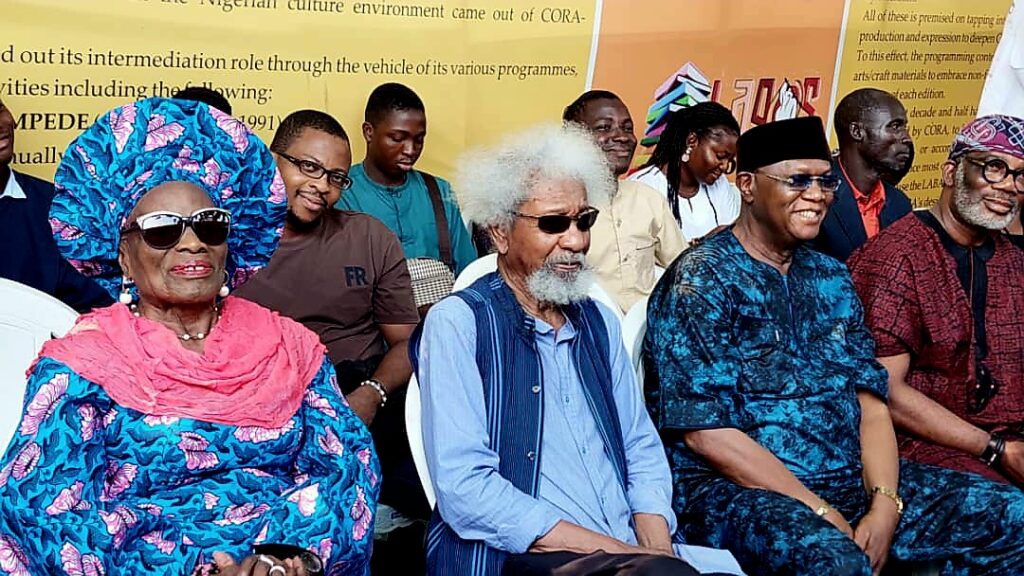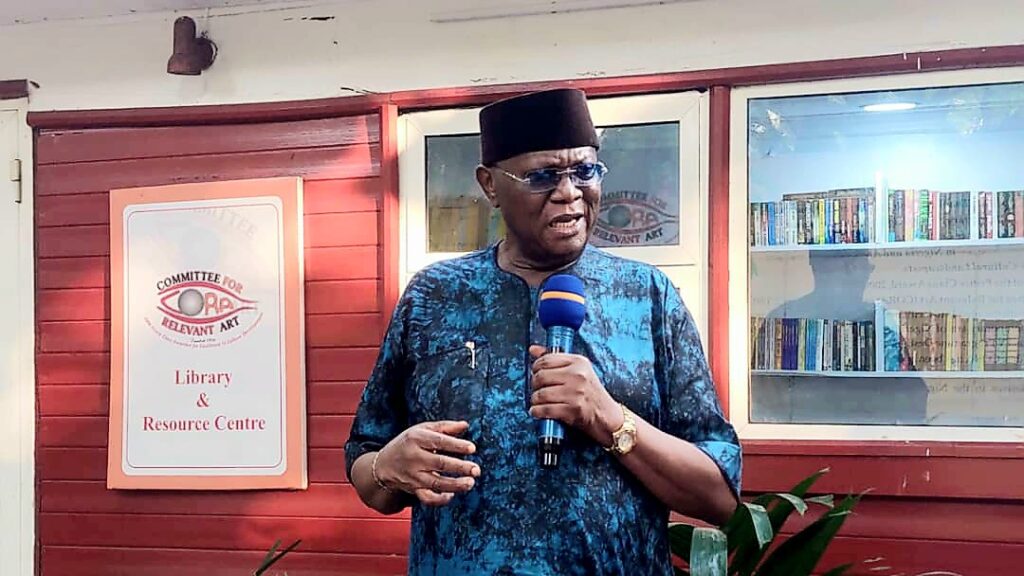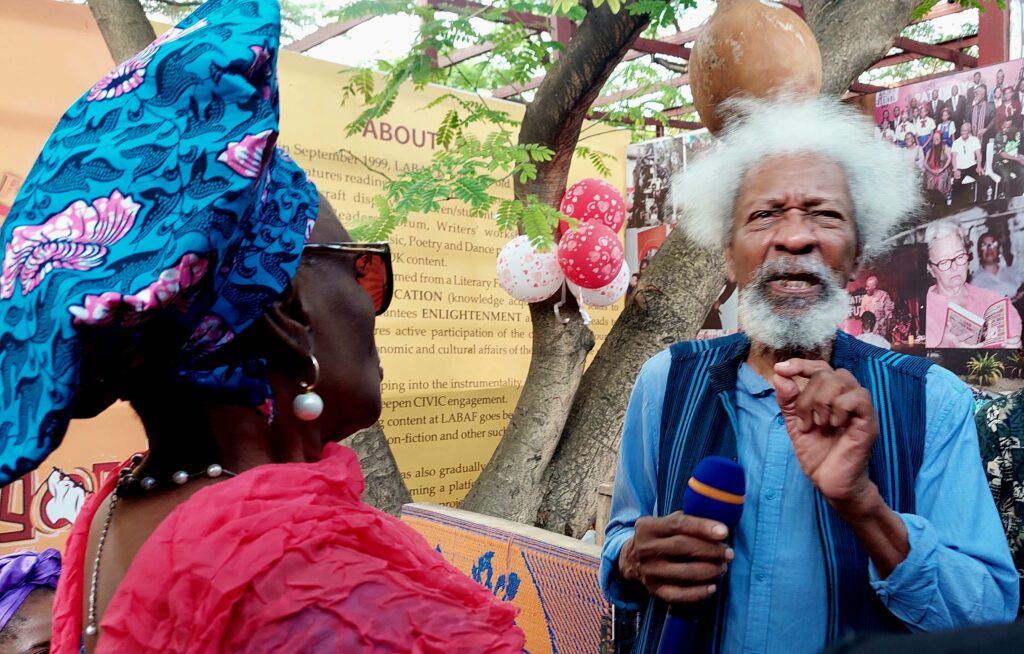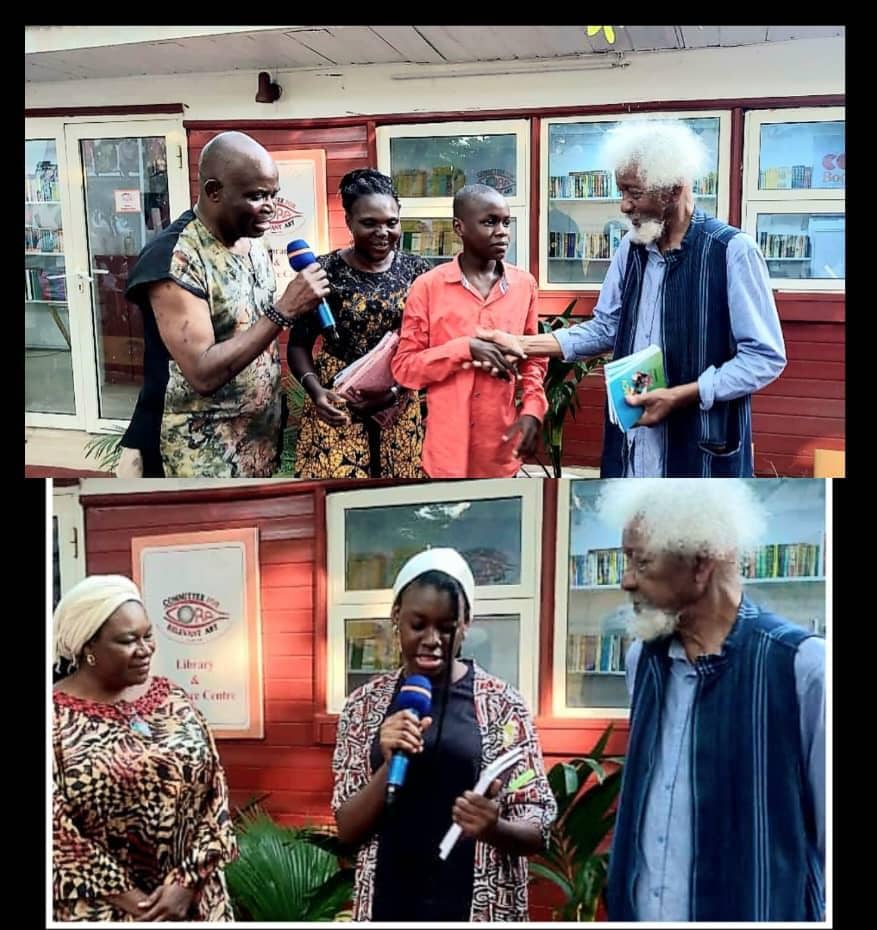LightRay! Books and Literary Society: Prof Soyinka @90 and Why CORAVille is the Rave for Young and Experienced Writers
In the age of AI and digital access to books, the reading culture and manner of book consumption continues to be a talking point. Audio books and video dramatisation or reading of books is now the rave. For eco-friendly champions, though, it would seem printed books is a clash on saving the trees and our planet.
What about mobile libraries? Will libraries survive this onslaught of digital natives and their consumers whose style of consumption of texts is different from hundreds of generations before them? That’s exactly what this edition on LightRay! Books and Literary Society focuses on.
By Ejiro Umukoro
Amidst the historic walls of Freedom Park, where echoes of colonial past now dance with the vibrant beats of cultural rejuvenation, CORA unveiled its latest gem: CORAVille – a haven of knowledge and creativity nestled within the heart of Lagos. As guests marveled at the transformation of a former prison into a sanctuary for the mind, Chairman Kayode Aderinokun laid bare the vision behind this endeavor, a vision fueled by the desire to nurture young minds and bridge the generational gap in values.
In his welcome remarks, Secretary of Committee for Relevant Art (CORA). Mr. Toyin Akinosho, gave a sneak preview of CORAVille – CORA Library and Resource Centre, located at the serene ambience of Freedom Park, on 1 Broad Street, Lagos, a former colonial prison transformed into a vibrant cultural hub.
“THE idea behind this goes back a long way, to the inception of the Lagos Book and Art Festival in 1999, in our eighth year of existence. It was a little high-minded. The nation had just returned to democracy and we thought that it needed a highly literate populace to engage with the norms of the popular vote.”
But it was not just bricks and mortar that defined CORAVille; it was a beacon of hope, a gateway to enlightenment in a world inundated with distractions. Aderinokun’s words echoed with a promise of an e-library, a digital realm where boundaries of physical space would dissolve, and knowledge would flow freely to all who seek it.”

Chairman of CORA Boad of Trustees’, Chief Kayode Aderinokun in clear terms drove home the vision behind the launch of CORAVille: “The whole concept of having a library and resource centre here is to create a hub that will take young people off the streets. Some of our biggest problems is actually management and transfer of values between the generations. We haven’t done too well in that area. We see some new developments that work in our favour. We have a physical space here, and it has its limitations. How many people can we accommodate here? But then, technology came to our rescue. So, this is a physical, symbolic space that brings all of us together, but we are actually aspiring to set up an e-library that has a much bigger capacity to deal with some of the problems we have today. The library is just a symbolic location.
“In terms of archiving, we have been so poor. Prince Yemisi Shyllon is doing so much in that area, gathering valuable historical material of knowledge. So, we want to do our own small bit of archiving, and we think that even this small centre could be for the development of communication of various types. I just finished an interview on the radio now and they asked me a question: what is our aspiration? Seriously speaking, our aspiration is to touch as many lives as possible. On the board and management of CORA, we have all types of skills that we need to actually harness, but we’ve labelled ourselves as non-profit, which creates a problem for us. We don’t want to make profit, but at the same time, we need to sustain these goals and objectives. I trust that members of the board of CORA are shaking heads in agreement. We will put heads together and find ways to go about it. We’ve been in existence for over 25 years, and that same zeal and passion that have brought us thus far will take us farther. It’s a model that we want to establish and reinstate, that would survive and go beyond us. We use opportunities like this to talk to organizations and government, individuals of like minds to come around and support this our small endeavour. With the likes of Prof. Wole Soyinka in our corner, I’m sure we will do better than we are doing now.”

Nigeria’s walking-living museum, as we would love to describe him at LightRay!, Prince Yemisi Shyllon, Prominent art collector and founder of Yemisi Shyllon Museum of Art, Pan-Atlantic University, captured why writers, books and arts are such great influence in his life: “There are two heroes of mine who are living and there is one that is gone. My middle hero is seated in front of me, and he was just 32 years old when he risked his life for this country and he has done it so many times. I just hope Nigeria can recognize her heroes. I’m happy seeing what CORA is doing today to him. There is another hero of mine. He was Justice (Bola) Ajibola, and he was an attorney general of this country and the president of the Nigerian Bar Association. But this (Soyinka) is my own living hero. He has done so much for my country. The third hero I want to recognize is CORA, led by the great Aderinokun, Akinosho and Jahman (Anikulapo). I don’t know how you guys do it, but I want to tell you that I buy into your programme. You are helping us do what others should be doing but are busy looting. We are very grateful, and I’m hereby declaring publicly that I’m going to be a partner, starting with a donation of five copies of my own book.
“There’s a book that I want you to have in that library. We need to know our history and who we are, so we can plan better for the future. There’s a book titled Idan: The Legends of the Ages by Oladele Olusanya, and I’m donating five copies of this book to CORA for this library, so that young ones can come and know the history of Lamurudu to the fall of the Oyo Empire. So that you can take pride in being the children and the great-grandchildren of the great empires of Africa.”
In the midst of accolades and aspirations, a voice rose above the din, that of the legendary Prof. Wole Soyinka. With a blend of wisdom and wit, he challenged the status quo, calling out the digital age’s pitfalls and urging a return to the written word. His call to arms resonated with the crowd, igniting a fervor for intellectual emancipation. When asked of his view on the future of book reading and future of book sales by Dame TaiwoAjai-Lycett, CORA board member and stage matriarch, Prof. Soyinka responded in his characteristic upbeat response: “I was invited to be a guest of honour, which means I’m supposed to sit down and do nothing, and then you come and pose a monumental question and you expect me to offer you a solution? I didn’t come here prepared for anything and I refuse to be commandeered without notice or contract. What I’m going to do is collaborate with you on any effort because it’s a multi-directional problem, and I agree halfway with you when you referred to the majority of our upcoming generation being semi-literates; they’re illiterates. The only literacy they have is the literacy of Internet, the lowest form of social media. When I say they are illiterates, I don’t mean to disagree with you. I’m just stating the real fact. We are breeding a generation of illiterates, not just in terms of reading, but mentally illiterates, incapable of retaining a concept in their mind, not even for one microsecond.

“One of the solutions is to find ways of attracting them away from their lazy encounters with the world of the narrative. It’s a dangerous situation. They’re taking over the narrative and terrorizing those who don’t want to correct them, to direct them in the direction of other options. So, it’s not a question of brainwashing; it’s just saying getting them to open themselves to alternative narrative, and initiatives like this create excellent beginnings. So, we find ways of creating more and more of this nature, and find ways of bringing them to understand that these are not traps. We know that this is built on a former prison, but it’s being transformed in a very magnificent way. The theatre was where they used to hang people, but that’s the place that has been chosen to disseminate the works of imagination of their own peers and generation.
“So, we tell them things like that and they come and see for themselves, and even if it’s a prison, there’s something called jailbreak. They can break out of jail and go and do other things. I assure you that it is not a prison. On the other hand, it is a gateway to true enlightenment and personality liberation. Don’t be frightened by the name of this, CORA, ‘relevant arts.’ I’m appealing now to those who are going to donate books. Don’t start looking for books which are relevant. Relevant or irrelevant, just bring the books, and we will know how to make those works relevant.”
Riding on the significance of promoting healthy book reading culture, Akinosho adds: “We would run a Book Festival (and not a book fair), so we could have a number of programmes in which people are actually engaging with the contents of the books,” Akinosho told his guests. “Just as we didn’t want a book fair, which is about the publishing trade, we also didn’t want a literary festival, which is more about elite writers talking shop and not necessarily speaking to the material in book contents.
“We had always recognized that a once-in-a year event will not tackle the entrenched challenges of literacy in Nigeria. The plan was initially for 12 City Libraries in the country’s six geopolitical zones. Then we moderated it to Six City Libraries in Lagos. So the Library and BookTrek will be running programmes all year round. The BookTrek is an extension service idea, where we would engage authors year-round in all the six libraries in several nodes of Lagos.
“It’s also a Lifestyle advocacy; just as you can walk into a gallery (there are at least six exhibitions currently going on in several parts of Lagos as I speak), so also are there concerts (there’s a classical music concert at MUSON Centre every other Sunday evening); The Freedom Park hosts at least two concerts every weekend. So there should be readings. Book readings. For all intents and purposes, the BookTrek is a lifestyle advocacy: If I can wander into a musical concert uninvited, visit an art exhibition, or see a drama performance by merely buying a ticket, why can’t I join in a session of book reading? Why can’t I open The Guardian and, in the same space where the Culture Diary is publishing a list of exhibitions, I see A Book Reading at Ajangbadi, or Yaba, or Festac, and determine: when I leave the book reading, I will go and see the exhibition.”
CORA partner organisations, including the Network of Book Clubs and Reading Promoters in Nigeria (NBRP), Association of Nigerian Author (ANA), PEN International (Nigeria Centre), Unchained Vibes Africa (UVA), among others, gathered to offer their support.
Mr. Richard Mammah, President of NBRP, praised CORA for its progressive efforts in expanding the reading space. He emphasized the importance of collaboration, stating, “We will continue to support CORA, alongside ANA and others. On March 7, 2024, we will host the second edition of the Lagos Book Walk. Last year, we initiated the first walk in Ikeja and presented the Lagos Book Stakeholders Charter of Demands to the state government. Our requests are simple: two libraries in each of the 57 LCDAs in Lagos State, managed by the state government, and an additional two run by the LCDAs themselves. This would provide a total of 228 reading spaces across Lagos and its extensions. We are actively following up on these proposals and remain hopeful for their realization.”
As partners and supporters pledged their allegiance to CORAVille, it became clear that this was more than just a library; it was a movement, a cultural revolution sweeping across Lagos. From the president of NBRP to the indefatigable Dr. Folu Agoi, each voice added to the chorus of change, each commitment a step towards a brighter literary future.
Amidst the experienced amd notable literary figures, stood the young authors, Efe Roland Kalegha and Munirat Shitta-Bey, beacons of inspiration for generations to come. Their donation of books symbolized not just a gift of words but a passing of the torch to a new era of storytellers. Prof Wole Soyinka received the books on behalf of CRA. A creative dance drama performance by children from Kings and Queens Academy troupe spiced up the event spellbinding the audience.

As the event drew to a close, one couldn’t help but feel the palpable energy in the air, a sense of excitement for what lay ahead. CORAVille was more than just a library; it was a promise of a better tomorrow, a testament to the enduring power of literature to shape minds and transform lives. And with luminaries like Prof. Wole Soyinka leading the charge, the journey ahead seemed filled with infinite possibilities.





Comments